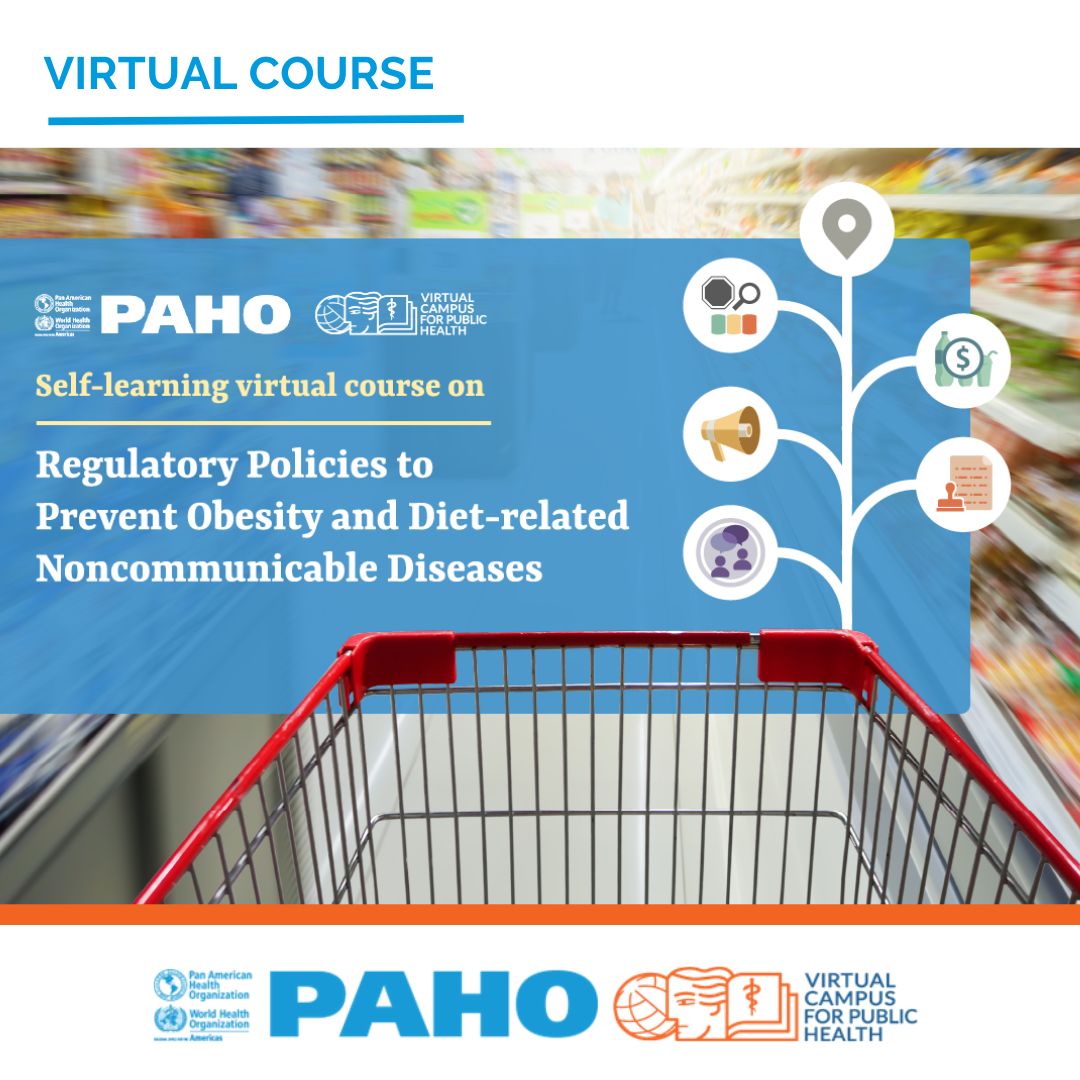Regulatory Policies to Prevent Obesity and Diet-related Noncommunicable Diseases

Countries in the Region of the Americas have been facing an increase in obesity and noncommunicable diseases (NCDs) associated with high mortality and morbidity rates. Both the Pan American Health Organization (PAHO) and World Health Organization (WHO) have established plans of action—including PAHO’s Plan of Action for the Prevention of Obesity in Children and Adolescent and the WHO Acceleration Plan to Stop Obesity—to transform obesogenic environments through the use of a comprehensive set of regulatory policies. To advance these agendas, PAHO is implementing a multi-module virtual course that focuses on effective regulatory policies that can help halt the rise in obesity and diet-related NCDs.
Course purpose
The course purpose is to strengthen the learner’s capacity to design and advance effective regulatory policies that reduce the demand for and offer of ultra-processed and processed products to prevent obesity and diet-related NCDs in the Region of the Americas.
Educational approach & workload
The course uses virtual teaching platforms of the VCPH, is interactive and highly visual, and includes multimedia resources and formative quizzes such as multiple-choice questions. The course uses a self-learning and self-instructional method, allowing participants to access its content when they wish and advance through the course at their own pace. Therefore, an estimated time of 60 to 120 minutes per module is considered, depending on the participant’s level of knowledge on the different topics.
Learning objectives
At the end of the course, the learner will:
• Be familiar with the WHO’s and PAHO’s Plans of Action to tackle obesity and NCDs.
• Have an increased understanding of how to design and advance the adoption, implementation, and monitoring of effective regulatory policies to prevent obesity and diet-related NCDs.
• Be familiar with key lessons from country cases with effective regulatory policies in place to prevent obesity and diet-related NCDs.
• Have an increased understanding of conflicts of interest and the significance of preventing and managing it for effective governance.
• Be familiar with PAHO/WHO tools to identify and support the prevention and management of conflicts of interest.
Audience
This course is aimed at policy makers, public health professionals, civil society organization representatives, public health nutrition advocates, such as researchers and practitioners, PAHO personnel and country and sub-regional officers.
Course Structure
|
Modules |
Contents |
|
Entrance test |
Assessment of prior knowledge. |
|
Introduction |
The course context, objectives and learning resources. |
|
Module 1- Front-of-package labeling (FOPL) |
Module 1 familiarizes learners with FOPL and enhances understanding of the principles and rationale for the implementation of FOPL as a policy tool to help prevent obesity and NCDs. |
|
Module 2- Sugar-sweetened beverage (SSB) taxation |
Module 2 familiarizes learners with SSB taxation and promotes understanding of the principles and rationale for SSB taxes as a policy tool to help prevent obesity and NCDs. |
|
Module 3 - Marketing of ultra-processed and processed food and non-alcoholic drink products |
Module 3 familiarizes learners with marketing restrictions for food and non-alcoholic drink products and enhances understanding of the principles and rationale for the various policy options to restrict the marketing of food and non-alcoholic drink products. |
|
Module 4 - Regulation of food and beverages in schools and other settings |
Module 4 familiarizes learners with the regulation of food and beverages in schools and other settings and enhances understanding of the principles and rationale for these regulations as a policy strategy to prevent obesity and diet-related NCDs. |
|
Module 5- Preventing and managing conflict of interest (COI) |
Module 5 familiarizes learners with the need to identify, prevent and manage COI and enhances learners’ understanding of the resources available to assist in assessing, preventing and managing potential COI. |
|
Final evaluation |
Final evaluation test of the course, recalling the key concepts from the course modules and resources discussed. |
